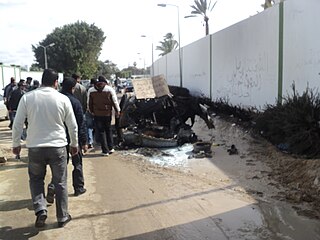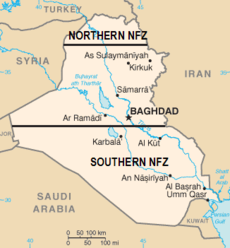
The Iraqi no-fly zones conflict was a low-level conflict in the two no-fly zones (NFZs) in Iraq that were proclaimed by the United States, United Kingdom, and France after the Gulf War of 1991. The United States stated that the NFZs were intended to protect the ethnic Kurdish minority in northern Iraq and Shiite Muslims in the south. Iraqi aircraft were forbidden from flying inside the zones. The policy was enforced by the United States and the United Kingdom until 2003, when it was rendered obsolete by the 2003 invasion of Iraq. French aircraft patrols also participated until France withdrew in 1996.

The Authorization for Use of Military Force Against Iraq Resolution of 2002, informally known as the Iraq Resolution, is a joint resolution passed by the United States Congress in October 2002 as Public Law No. 107-243, authorizing the use of the United States Armed Forces against Saddam Hussein's Iraq government in what would be known as Operation Iraqi Freedom.
A no-fly zone, also known as a no-flight zone (NFZ), or air exclusion zone (AEZ), is a territory or area established by a military power over which certain aircraft are not permitted to fly. Such zones are usually set up in an enemy power's territory during a conflict for humanitarian or military reasons without consent of the enemy state, similar in concept to an aerial demilitarized zone, and usually intend to prohibit the enemy's military aircraft from operating in the region. Military action is employed by the enforcing state and, depending on the terms of the NFZ, may include preemptive attacks to prevent potential violations, reactive force targeted at violating aircraft, or surveillance with no use of force. Air exclusion zones and anti-aircraft defences are sometimes set up in a civilian context, for example to protect sensitive locations, or events such as the 2012 London Olympic Games, against terrorist air attack. A no-fly zone is generally not considered a form of aerial blockade due to its more limited scope compared to an aerial blockade.

United Nations Security Council Resolution 687 was adopted on 3 April 1991. After reaffirming resolutions 660, 661, 662, 664, 665, 666, 667, 669, 670, 674, 677, 678 and 686 (1991), the Council set the terms, in a comprehensive resolution, with which Iraq was to comply after losing the Gulf War. Resolution 687 was passed by 12 votes to one (Cuba) against, with two abstentions from Ecuador and Yemen, after a very extended meeting. Iraq accepted the provisions of the resolution on 6 April 1991.

United Nations Security Council resolution 794, adopted unanimously on 3 December 1992, after reaffirming resolutions 733 (1992), 746 (1992), 751 (1992), 767 (1992) and 775 (1992), the Council "[expressed] grave alarm" regarding the situation in Somalia and authorised the creation of the Unified Task Force (UNITAF) to create a "secure environment for humanitarian relief operations in Somalia" in order to provide "essential for the survival of the civilian population". The current resolution determined that "the magnitude of human tragedy caused by the conflict in Somalia, further exacerbated by the obstacles being created to the distribution of humanitarian assistance [constitutes] a threat to international peace and security".

United Nations Security Council resolution 1483, adopted on 22 May 2003, after recalling all previous resolutions on the situation between Iraq and Kuwait, the Council lifted trade sanctions against Iraq and terminated the Oil-for-Food Programme.

In United Nations Security Council resolution 661, adopted on 6 August 1990, reaffirming Resolution 660 (1990) and noting Iraq's refusal to comply with it and Kuwait's right of self-defence, the Council took steps to implement international sanctions on Iraq under Chapter VII of the United Nations Charter. This was the second resolution by the Security Council over the invasion of Kuwait.

United Nations Security Council resolution 1284, adopted on 17 December 1999, after recalling previous relevant resolutions on Iraq, including resolutions 661 (1990), 687 (1991), 699 (1991), 707 (1991), 715 (1991), 986 (1995), 1051 (1996), 1153 (1998), 1175 (1998), 1242 (1999) and 1266 (1999), the council established the United Nations Monitoring, Verification and Inspection Commission (UNMOVIC) to replace the United Nations Special Commission (UNSCOM). It was the final resolution adopted in 1999.

United Nations Security Council resolution 706 decided on a mechanism to allow Iraq to sell oil in return for humanitarian aid from Member States. The council, acting under Chapter VII, adopted the resolution on 15 August 1991, after recalling resolutions 661 (1990), 686 (1991), 687 (1991), 688 (1991), 692 (1991), 699 (1991) and 705 (1991). The provisions of Resolution 706 functioned in a way similar to that which was later implemented in the Oil-for-Food Programme under Resolution 986 in 1995.

In United Nations Security Council Resolution 666, adopted on September 13, 1990, after recalling resolutions 661 (1990) and 664 (1990) which discussed the humanitarian situation in Iraq and Kuwait and the detention of nationals from foreign countries, the Council decided to ask the 661 Committee to determine if humanitarian needs have arisen and to keep the situation under review. At the same time, it expected Iraq to comply with its obligations under international law, including the Fourth Geneva Convention, relating to the safety and detainment of third-state nationals in Iraq and occupied Kuwait.

United Nations Security Council resolution 674, adopted on 29 October 1990, after recalling resolutions 660 (1990), 661 (1990), 662 (1990), 664 (1990), 665 (1990), 666 (1990), 667 (1990) and 670 (1990) on the topic of Iraq, the council condemned the continuing situation in occupied Kuwait after the Iraqi invasion on 2 August 1990, reaffirming the goal of the international community of maintaining international peace and security.

United Nations Security Council resolution 712, adopted on 19 September 1991, after recalling resolutions 661 (1990), 686 (1991), 687 (1991), 688 (1991), 692 (1991), 699 (1991), 705 (1991) and 706 (1991), the council, acting under Chapter VII, reaffirmed and discussed provisions of Resolution 706 and called for international co-operation.

United Nations Security Council resolution 778, adopted on 2 October 1992, after recalling resolutions 687 (1991), 688 (1991), 692 (1991), 699 (1991), 706 (1991) and 712 (1991), the council, acting under Chapter VII, decided to authorise states holding funds from the sale of Iraqi petroleum to transfer funds to the escrow account under resolutions 706 and 712, of which 30 per cent would be transferred to the United Nations Compensation Commission.

United Nations Security Council resolution 787, adopted on 16 November 1992, after reaffirming Resolution 713 (1991) and all subsequent resolutions on the topic, the council called upon the parties in Bosnia and Herzegovina to consider the draft outline constitution as a basis for negotiating a political settlement of the conflict in the country, and went on to impose further international sanctions on the Federal Republic of Yugoslavia.

United Nations Security Council resolution 1143, adopted unanimously on 4 December 1997, after recalling all previous resolutions on Iraq, including resolutions 986 (1995), 1111 (1997) and 1129 (1997) concerning the Oil-for-Food Programme, the council, acting under Chapter VII of the United Nations Charter, extended provisions relating to Iraqi oil sales for a further 180 days to meet the humanitarian needs of the Iraqi people.

United Nations Security Council resolution 1199, adopted on 23 September 1998, after recalling Resolution 1160 (1998), the Council demanded that the Albanian and Yugoslav parties in Kosovo end hostilities and observe a ceasefire.

United Nations Security Council resolution 1472, adopted unanimously on 28 March 2003, after recalling all previous resolutions on Iraq, including resolutions 661 (1991), 986 (1995), 1409 (2002) and 1454 (2002) concerning the provision of humanitarian aid to the Iraqi people, the Council approved adjustments to the Oil-for-Food Programme giving the Secretary-General more authority to administer the programme for the following 45 days. The programme had been suspended when the Secretary-General ordered all United Nations staff out of Iraq days before the U.S.-led invasion.

United Nations Security Council Resolution 1958, adopted on December 15, 2010, after recalling resolutions 986 (1995), 1472 (2003), 1476 (2003), 1483 (2003) and 1546 (2004) on the situation in Iraq, the Council terminated the residual activities of the Oil-for-Food Programme.

United Nations Security Council Resolution 1970 was a measure adopted unanimously by the UN Security Council on 26 February 2011. It condemned the use of lethal force by the government of Muammar Gaddafi against protesters participating in the Libyan Civil War, and imposed a series of international sanctions in response.

United Nations Security Council Resolution 2016 was unanimously adopted on 27 October 2011 on the situation of Libya during the Libyan Civil War.
















